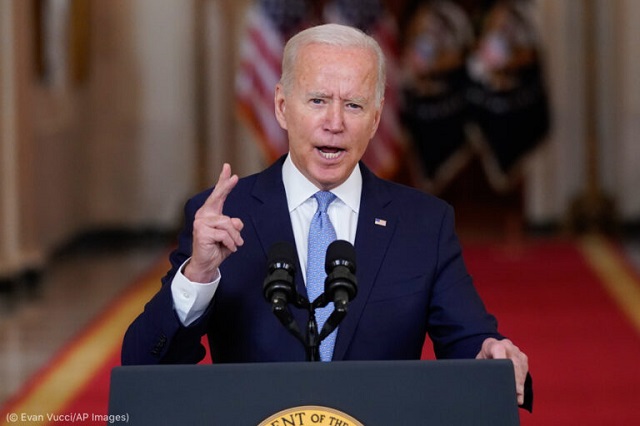Back in 2014, then-Vice President Joe Biden called corruption “a cancer that eats away at a citizen’s faith in democracy.” Now, under President Biden, the United States leads a global fight against corruption at home and abroad.
In a June 3 memorandum, Biden linked accountable and transparent governments and financial systems to healthy democracies.
“When leaders steal from their nations’ citizens or oligarchs flout the rule of law, economic growth slows, inequality widens, and trust in government plummets,” Biden said, elevating the fight against corruption to a national security priority.
Corruption costs developing countries $1.26 trillion annually.
Biden will host a Summit for Democracy December 9–10 focusing on anti-corruption efforts, advancing human rights and defending against authoritarianism.

President Biden (© Evan Vucci/AP Images)
The Organisation for Economic Co-operation and Development in November 2020 commended the United States for strong enforcement of U.S. anti-corruption laws and for promoting good governance abroad.
In Ukraine, the U.S. Agency for International Development (USAID) has supported, among other initiatives:
- The establishment of a High Anti-Corruption Court.
- ProZorro, a digital tool for improved accounting and transparency of government purchases.
- New Ukrainian judicial reform and transparent land purchases.
These and other measures have saved Ukraine’s government some $6 billion since 2016.
“The United States stands with you as you bravely work to build a more honest, just, and democratic world,” USAID Administrator Samantha Power told an anti-corruption conference in Kyiv in June.
In Honduras, USAID supports the National Anti-Corruption Council, which has trained hundreds of public officials in good governance. The council recently identified $68 million in alleged corruption schemes related to the procurement of ventilators and other equipment for the country’s COVID-19 response.
Democracies can’t thrive without vibrant civil societies. Important meeting w/civil society leaders in #Honduras who defend human rights & tackle corruption. Their work is essential.
— Samantha Power (@PowerUSAID) May 4, 2021
Both USAID and the U.S. State Department’s Bureau of International Narcotics and Law Enforcement Affairs (INL) have helped foster judicial reform in Eastern Europe. INL supports the Central & Eastern European Judicial Exchange Network, a coalition of judges from 18 countries. In March 2020, the network issued a Judicial Manual on Independence, Impartiality and Integrity of Justice that has informed ethics codes and other judicial reforms in numerous countries.
USAID has trained more than half of Kosovo’s judges in a code of ethics and also helped improve judicial efficiency. In two years, judges in Kosovo cut their backlog of cases by 30%.
In partnership with Judge Afërdita Bytyqi, the first woman to become president of the Basic Court of Pristina, Kosovo’s largest court, USAID supported the court’s public information office in publishing decisions online where anyone can access them.
“The role of the justice system in democracy is big,” Bytyqi said. “Because only when we have an efficient system can we say that we have a democratic system in Kosovo.”
Banner image: USAID has worked to improve judicial transparency in Kosovo in partnership with Afërdita Bytyqi, center, the first female president of Kosovo’s largest court. (USAID/Sebastian Lindstrom)







COMMENTS0
LEAVE A COMMENT
TOP